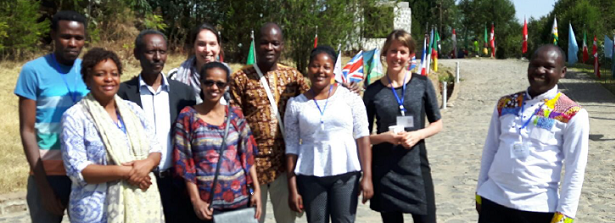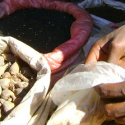Follow the Food participation in the African Landscape Dialogue

On March 7, 2017, PhD candidates Senait Getahun and James Wangu of the GCP project Follow the Food presented a research poster at the “African Landscape Dialogue” conference in Addis Ababa. This international conference brought together about 140 policy makers, development workers and companies to discuss and learn from different landscape initiatives across the African continent. For the Follow the Food team it was particularly interesting to find out how a landscape approach can be useful for analyzing the impact of companies on local food security.
Landscape approaches to give insight in inclusive business opportunities
Landscape approaches are hot in the development sector. Broadly speaking landscape approaches encompass all “strategies for integrated management of land, water and living resources aimed to achieve social, economic, and environmental objectives in areas where agriculture, mining, and other productive land uses compete with environmental and biodiversity goals” (Adapted from FAO, 2012).
During the conference it was explored how a landscape perspective could help in identifying the impact and role of companies in their environment. This was very relevant for the Follow the Food GCP-project. The Follow the Food consortium investigates the impact of inclusive business models: e.a. businesses that aim to contribute to local development and at the same time gain a profit, on farmers’ livelihoods in Kenya, Ghana and Ethiopia. Empirics show that nevertheless the good intentions also inclusive business-models can have adverse effects on local economic development. For example the fact that not all farmers in a community are able to sell to the company might aggravate inequality. The presence of an agri-business could also increase pressure on land and water. Discussions with companies on their activities and challenges experienced in the landscape provided insights in options for inclusive business oppotunities.
Two PhD examples
James presented the preliminary findings of his study on the impact of the French beans exporter Meru Greens in Kenya on the livelihoods of small scale farmers. From his presentation it became clear that the concrete landscape farmers find themselves in, is of great influence on whether farmers are able or not to sell to the company. Requirements for those small scale producers to be able to deliver to the exporter are access to water and being located near to a road. Unintendedly the inclusive business model of Meru Greens thus excludes farmers.
Senait focused on the case of Heineken International in Ethiopia. Her poster showed that Heineken invests in its smallholders by offering them trainings, inputs and good barley seeds. However, the company pays little attention to the environment and the effect of yearly cultivation of barley on soil fertility in the long run. As such the posters provided a first impetus for reflecting on how a landscape approach could enhance understanding of the impact of businesses. Which in impact studies and evaluations is mainly measured in terms of created job employment and increased farmers’ income.
Follow-up
Overseeing lesson from the conference, the Follow the Food consortium is investigating how to work more closely with the private sector in order to disseminate insights gathered from its research.






